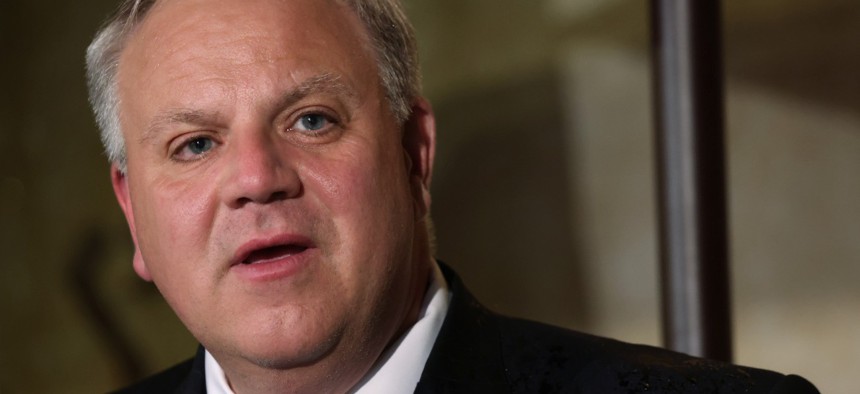
David Bernhardt served as Interior secretary from April 2019 to January 2021. Alex Wong/Getty Images
Trump’s Interior Secretary Was Cleared in Probe on Water Project and Former Client
So was the department’s ethics office that conducted a review for possible conflicts of interest.
President Trump’s second Interior secretary was cleared by a federal watchdog of any impropriety with regards to his work on a federal water project and the department’s ethics office was found to have conducted a sufficient review of possible conflicts of interest, after allegations indicated otherwise.
The Interior inspector general office looked into allegations involving David Bernhardt, who served as Interior secretary from April 2019-January 2021, and his work with the California Central Valley Project, which is a large federal water project that the Interior's Bureau of Reclamation operates. The allegations included that he violated the Trump administration’s ethics pledge and federal conflict of interest rules through his work on issues involving the project while secretary and acted improperly to help his former client, the Westlands Water District (a California public agency that supplies water to 700 farms), receive a contract to receive the water.
“We did not substantiate any of the allegations regarding improper conduct by Mr. Bernhardt,” the Interior IG said in a report issued Jan. 19. “We also concluded that the evidence did not support the complainants’ allegations regarding the [Interior ethics office] review of Mr. Bernhardt’s potential conflicts of interest.”
In regards to the ethics pledge, which was a 2017 executive order from President Trump, Bernhardt didn’t violate the section that banned political appointees from working on matters involving their former employer or clients for two years after their appointment because “Bernhardt represented the [Westlands Water District] as an attorney, the [water district] is a state agency, and— as such—is excluded from the definition of ‘former client’ under the ethics pledge,” said the report.
Also, Berhardt did not violate restrictions on political appointees who were registered lobbyists from working on dealings that they lobbied on within two years before the date of their appointment, the probe found.
“Bernhardt’s participation in [the California Central Valley Project] water issues did not violate the Ethics Pledge or the Standards of Ethical Conduct because the matters in which he participated were not ‘particular matters’ as that term is defined under the ethics rules, and, thus, these rules were not implicate,” said the report.
As for the ethics office, the IG found that its review of Bernhardt’s potential conflicts of interest was sufficient and followed standard review practices, following various allegations about the quality of their review. Also, the IG didn’t find any evidence that Bernhardt tried to coerce or intimate the Interior’s alternate designated agency ethics official,” which is the primary deputy to the designated agency ethics official.
Lastly, the IG office didn’t find any evidence that Bernhardt had any involvement in the Westlands Water District getting a favorable and permanent contract or that the contract lacked sufficient oversight provisions.
The report says Bernhardt declined to take part in a voluntary interview with the IG office “without special conditions that were inconsistent with our interviewing policies and practices.” The IG sent the report to the current Interior secretary, Deb Headland, for any actions deemed appropriate. The Interior Department declined to comment to Government Executive on the report.
The report “reflects what we have always known -- that former Secretary Bernhardt has conducted himself with professionalism and integrity both in the private sector and while serving at the Department of the Interior,” Bernhardt’s attorney Danny Onorato told Government Executive in a statement on Monday. “The report completely vindicates Secretary Bernhardt” and “confirms that the allegations against Secretary Bernhardt were meritless and that he fully complied with all his ethical and legal obligations from day one of his term of public service.”
Meanwhile, Aaron Weiss, deputy director of the Center for Western Priorities, a conservation and advocacy organization seeking to protect land, water and communities in the American West, said in a statement, “this report is a step-by-step instruction manual for future swamp creatures who want to help their clients while skirting their ethical obligations to the American people.”
The water deal has been subject to legal challenges, and, as The New York Times, reported Westlands Water District, has “disputed allegations that it received special treatment.”
This was not the only time Berhardt has come under review by the Interior IG, which said in April 2019 it received seven complaints “from a wide assortment of complainants alleged various potential conflict of interest and other violations” by Bernhardt from when he was deputy secretary.
In May 2022, the IG office issued a report based on its review of allegations that he violated the Lobbying Disclosure Act before joining the Interior Department as deputy secretary in 2017 by continuing to work on legislative matters for a “water district” (which is not named in the report, but was identified by news outlets as Westlands Water District) after he deregistered as a lobbyist in November 2016.
“Based on the evidence we obtained, we concluded that the conduct we identified, standing alone, did not show that Mr. Bernhardt acted as a lobbyist within the meaning of the statute after deregistration,” said the report. “In arriving at this conclusion, however, we encountered a number of limits to our ability to obtain information.”
Bernhardt’s predecessor, Ryan Zinke, who is now a sitting member of Congress, was also subject to various inspector general and other investigations. For instance, last year, the IG said he did not comply with his ethics obligations.
At the time of the report’s issuance Zinke was running for Congress and his campaign said the report was “Biden administration led” (although the Interior IG Mark Greenblatt, was nominated by Trump in 2019) and contained “false information.”







